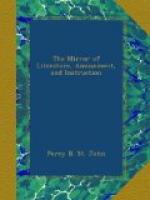The letters of James Howell, Esq. are well known as fluent examples of the best style of writing of his day, and as repositories of many curious facts and intelligent remarks. The following letter appears to be addressed to Lord Dorchester—
“My Lord,—The subject of this letter may, peradventure, seem a paradox to some, but not, I know, to your Lordship, when you are pleased to weigh well the reasons. Learning is a thing that hath been much cried up, and coveted in all ages, especially in this last century of years, by people of all sorts, though never so mean and mechanical; every man strains his fortune to keep his children at school; the cobbler will clout it till midnight, the porter will carry burdens till his bones crack again, the ploughman will pinch both back and belly to give his son learning, and I find that this ambition reigns no where so much as in this island. But, under favour, this word, learning, is taken in a narrower sense among us than among other nations: we seem to restrain it only to the book, whereas, indeed, any artisan whatsoever (if he knew the secret and mystery of his trade) may be called a learned man: a good mason; a good shoemaker, that can manage St. Crispin’s lance handsomely; a skilful yeoman; a good ship-wright, &c. may be all called learned men, and indeed the usefullest sort of learned men.
“The extravagant humour of our country is not to be altogether commended—that all men should aspire to book-learning; there is not a simpler animal, and a more superfluous member of a state than a mere scholar, a self-pleasing student. Archimedes, though an excellent engineer, when Syracuse was lost, was found in his study, intoxicated with speculations; and another great, learned philosopher, like a fool or frantic, when being in a bath, he leaped out naked among the people, and cried, ‘I have found it, I have found it,’ having hit then upon an extraordinary conclusion in geometry. There is a famous tale of Thomas Aquinas, the angelical doctor, and of Bonadventure, the seraphical doctor, of whom Alexander Hales, our countryman, reports, that these great clerks were invited to dinner by the French King, on purpose to observe their humours, and being brought to the room where the table was laid, the first fell to eating of bread as hard as he could drive, at last, breaking out of a brown study, he cried out ‘Conclusum est contra Manichaeos;’ the other fell a gazing upon the Queen, and the King asking him how he liked her, he answered, ’Oh, sir, if an earthly Queen be so beautiful, what shall we think of the Queen of Heaven?’ The latter was the better courtier of the two.
“My Lord, I know none in this age more capable to sit in the chair, and censure what is true learning, and what not, than yourself; therefore, in speaking of this subject to your Lordship, I fear to have committed the same error as Phormio did, in discoursing of war before Hannibal.




